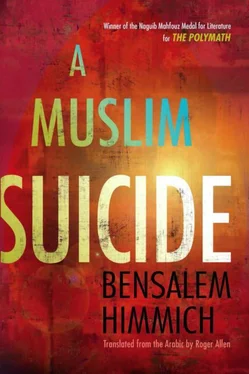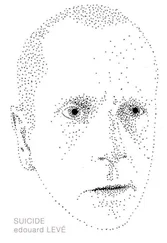"Yes indeed," people who could hear me repeated, "God's earth is spacious and wide."
The entire group followed suit, and some of them cited the hadith "A scholar who gives people the benefit of his wisdom is better than a thousand servants."
As I left the mosque, I was surrounded by the crowd. I walked at their head, asking them to proceed quietly and without fuss, since I was anxious to avoid confrontations with the police. I was also keen to avoid both banks of the Nile River because that was where astrologers, gamblers, entertainers, shadow-players, and fortune-tellers hung out, and I certainly did not want to attract stray indigents and beggars. For that reason I led this large crowd to the graveyard at the base of the Muqattam Hills. First I made them all sit on a piece of bare, flat rock; then I proceeded to deal with issues connected with their daily life and work, along with others that concerned more intellectual and religious matters. Some of them had questions concerning law, theology, philosophy, and Sufism, and I did my best to answer them as simply as I could. I brought things to a close by telling them about my theory concerning the true path to investigation and a closer path to God, linked to the conditions of detachment and abstraction that I deemed necessary for that process. I concluded by responding to questions they had concerning the conflict against the Crusader invasion. I told them that the fight against these invaders was an absolute obligation on all those who were capable of fulfilling the function, excluding the destitute, aged, and sick.
As the sun was setting, I stood up to leave. In the students' expressions I could see the light of appreciation and understanding; their warm and fervent comments competed in singing my praises. I advised them to return to their normal lives. Some of them took the trouble to warn me about some of the jurists and instructors at the Azhar. They told me that they had heard such people speaking in angry, condemnatory tones about me. "This man from Spain," they provided as an example, "has come to Egypt to corrupt our youth, just as he has done in the past in Murcia, Sabta, and Bijaya"; or, "this pseudo-philosopher is trying to put genuine and pious religious scholars out of a job by turning people against them. He must be stopped in his tracks." Having provided me with these details, they all said their farewells and ran to catch up with their comrades.
One old man, however, stayed behind and introduced himself as the keeper of the graveyard. He told me that he had much appreciated what I had to say, even though he did not understand all of it. He now invited me to spend the night in his house amid the graves of worthy believers. After a moment's hesitation I accepted his offer and followed him. I found myself in a large tomb lit by candles placed on tombstones; the walls were covered with cloths and rugs. He proceeded to tell me about some of the people who were buried there, one by one, all of them saints and holy men, although I had not heard of any of them. He offered me a piece of bread and some dates. He told me that he had things to do, and went on to say that I should not worry if a few vagrants came in to share my abode for the night. He then told me we would meet next morning, Friday, that being-as he informed me-the day for visits to tombs and charitable donations.
I sat on the floor, doing my best to control my anxieties about both the dead people inside the tomb and the living vagrants who would inevitably be arriving. If the latter group got a mere whiff of the gold I had on me, they would undoubtedly steal it and maybe kill me in the process. For their part, the dead would be rolling in their graves, furious at me for carrying so much money with me in their presence and keeping it hidden.
Prayer is the great antidote to such worries and tribulations!
I spent the first half of the night praying and performing extra intercessions and liturgies. If anyone came in, I paid no attention. I ignored all movements and mutterings, not to mention loud snores and farts. I stayed awake, without sleeping a wink, until dawn, when I performed my ablutions and prayed. When I had finished and looked around, I spotted the keeper right behind me, offering me his prayers and blessings. Standing up, I gave him some funds as a charitable gift, whereupon he blessed and thanked me even more. That done, I left the tomb. As the city of Cairo was waking up and the bustle of daily life was gradually returning to its quarters and alleyways, I made my way back to my quarters. I passed by a crop market and bought a sack of fodder, which I offered my horse as soon as I got to his stable, along with a pail of water. Once I was sure he was fine, I headed for my room, hoping to make up for the sleep I had missed.
At some point-it may have been between noon and sunset-I was awakened from my deep slumber by the din of people yelling at each other. When I listened to what was being said, it emerged that my host was uttering the strongest possible oaths to the effect that he had no intention of handing over anyone who was in his care, even if the governor himself showed up with his guards. With that, he locked the door and went back to his quarters, invoking God's aid as he did so. I gathered that the entire matter concerned me, so I immediately went to see him, greeted him warmly, and asked him what the story was. He told me that the police had come to take me before the chief judge for some particular matter. He had refused to respond to their demand and sent them packing. I thanked him and promised that I would respond to their request the next day before leaving Egypt. He made it clear to me that his offer of protection did not extend beyond the walls of his residence. He then handed me a letter, said his farewells, and left.
I lay down on my blanket. Opening the letter I read it through once and then a second time. It was from a merchant in Tangier to whom Al-Shushtari had given the charge of sending me information about my followers and family. The gist of it was that my beloved wife was fine. The man himself had met her in Tangier where she was staying with her uncle and Hamada. They were all in good health, and they all hoped that I would return to the Maghrib safe and sound. There was even a note from Fayha' herself, the light of my life. The letter also informed me that the house in Sabta was being looked after by Bilal and two servants, so everything was fine there too. The news about my students and friends was varied: some had died during the famine, while others had been scattered hither and yon by vicissitudes of this troubled life of ours.
I now made up my mind to continue my journey to Mecca and the Holy Ka`ba. I wrote a letter to Abu al-Hasan to that effect, on the assumption that he would find it when he stayed with Shaykh Abu al-Naja. That done, I ate something, prayed, and then fell asleep. When I woke up next morning, I handed the letter to my host and asked him for the address of the chief judge and the appointed time for the departure of the caravans for the Hijaz region in Arabia. He gave me that information, then wished me well. I was so impressed by his generosity and magnanimity that I handed him one of my purses of gold. He refused to accept it, saying that my need was greater than his. When I insisted that he take it, he still refused. As a compromise, I buried it in the ground and asked him to show Al-Shushtari where it was as soon as he arrived. He agreed to do that. After embracing him, I departed.
I left my horse at the tethering-post of the judge's residence and headed for his chambers. Some guards stopped me and asked for my identity. I made do with informing them that I was the person whom their master had sent to the residence of Abu al-Naja the day before. They immediately pointed me toward a hall facing an enormous door and told me to wait there. I started thinking about the questions the judge was going to ask and prepared short, pithy responses to them. Then I crafted some questions of my own that I would pose to him concerning major issues involving the Muslim peoples and matters concerning both present and future. I spent a long time waiting and was thinking of leaving and going my own way when a gruff voice instructed me to enter. I crossed the threshold and found myself in a huge chamber. On a dais a number of men were assembled, in the midst of whom was a man whose beard was as fulsome as his body, with broad shoulders and forehead. With a broad sweep of his cane he indicated to me to approach and sit down in front of him. After presenting my greetings, that is what I did.
Читать дальше












